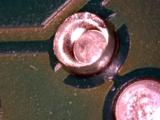|

|
|
| Ask the Experts | |||||||
|
|||||||
|
September 19, 2012 - Updated September 11, 2012 - Originally Posted Solder Popping Out of Holes
P.V. |
|||||||
| Expert Panel Responses | |||||||
|
It'shard to say for sure, not knowing more specifics of the PWB construction andthe thermal history of the board. What I think might be happening isthat there was a solder plug in the via, and subsequent heating (e.g. reflow)caused a void within the solder plug to expand, pushing the surface of thesolder up. Because no flux was present, it just domed up, and did not wet thehole wall. That's my story, and I'm sticking to it!
Process Engineer Astronautics Fritz's career in electronics manufacturing has included diverse engineering roles including PWB fabrication, thick film print & fire, SMT and wave/selective solder process engineering, and electronics materials development and marketing. Fritz's educational background is in mechanical engineering with an emphasis on materials science. Design of Experiments (DoE) techniques have been an area of independent study. Fritz has published over a dozen papers at various industry conferences.
Solder "popping"out of holes during the assembly process can be caused by outgassing ofmoisture from the PTH. This is typicallyfacilitated by substandard plating in the holes that allows moisture trapped inthe substrate to outgass through the plating into the barrel when the solder istrying to wet and take hold. It wouldlikely be in your best interest to have the holes in question Microsectioned tosee if they meet IPC-6012 requirements for plating thickness andconsistency. A stopgap measure could beto thoroughly bake the moisture out of the boards, but this is a band-aid andnot a fix and it may reduce your solderability due to oxide formation andintermetallic growth during the bake.
CEO/CTO Microtek Laboratories Bob Neves has spent the last 27 years working for Microtek Labs involved in qualification, conformance and failure analysis of PCB's, PCBA's and the materials that go into making them up. Neves has served as the IPC's Rigid Board General Committee Chairman, HDI General Committee Chairman, TAEC Chairman and have served on more than 50 IPC Committees. He was awarded both the IPC's President's Award and Hall of Fame award for service to the electronics industry.
I'm not sure I've seen this, but I guess I can gamble and offermy two cents. If the solder is coming out of the holes the implication isthere is no intermetallic layer being formed between the solder joint and theplating in the hole? Check the surface of the barrel or plated through hole fora coating of some kind, be it either solder mask or some other type of coatingeven perhaps oxidation. Many times when solder mask is improperly applied it isremoved and replaced and the removal process could be a chemical wash whichwould dissolve the initial material, but also coat the entire board, whichwould include the plated through holes. If the conditions is caused byoxidation this will prevent the solder from wetting to the base material andthis could also allow the solder not to be metallurgically connected to thebarrel. When soldersolidifies it shrinks, so if the solder is not metallurgically bonded to thebarrel it can now be loose in the pth and if all conditions were correct, couldin fact be pushed out of the plated through holes.
Vice President, Technical Director EPTAC Corporation At EPTAC Corporation, Mr. Lambert oversees content of course offerings, IPC Certification programs and provides customers with expert consultation in electronics manufacturing, including RoHS/WEEE and lead free issues. Leo is also the IPC General Chairman for the Assembly/Joining Process Committee.
|
|||||||
| Submit A Comment | |||||||
|
Comments are reviewed prior to posting. You must include your full name to have your comments posted. We will not post your email address. |
|
Free Newsletter Subscription
Circuitnet is built for professionals who bear the responsibility of looking ahead, imagining the future, and preparing for it. Insert Your Email Address |
|

|






